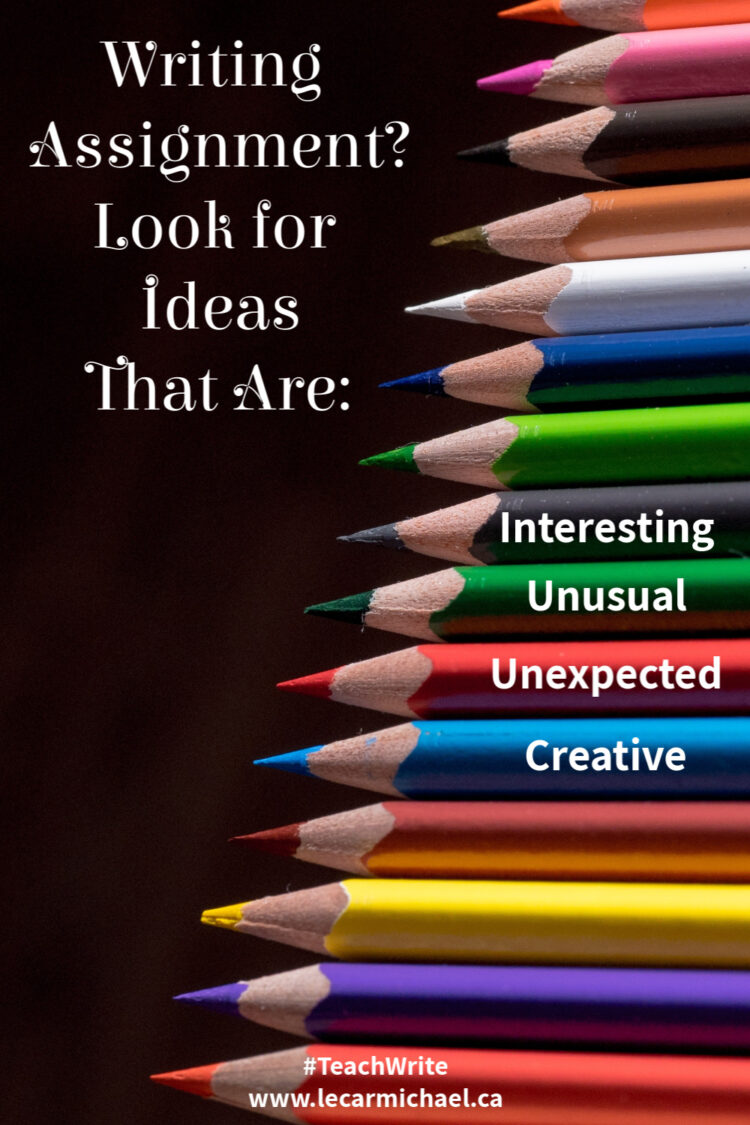Welcome to Teach Write! This column draws on my 20 years’ experience teaching writing to kids, university students, and adult learners. It includes ideas and exercises that teachers and students can use in the classroom, and creative writers can use to level up their process.
School is starting soon (however strange and remote it may be), which means… writing assignments! Today on Teach Write, we are talking about coming up with ideas for writing on assigned topics.
True story: most of my children’s books are on topics I didn’t choose. A couple of them are on topics that I NEVER would have chosen, had I been left to my own devices. That’s because I started my career in educational publishing. Educational publishing produces kids’ books exclusively for the school and library market, so publishers design a series to meet curriculum standards and then hire writers to do the work. As one of those writers, I’d get an email that said, “Want to write a book about hybrid cars?” and I’d either have to say “No thanks, I don’t want to publish a book this year” or “Sure!” and figure out the difference between a carburetor and a catalytic converter later.
Similarly, a number of children’s magazines are designed around themes, meaning writers have to choose from  a list of predetermined topics and develop ideas that fit that theme. All of which is to say that a huge portion of the children’s publishing market works on the same model as the school writing assignment: here’s a topic, show me what you’ve got.
a list of predetermined topics and develop ideas that fit that theme. All of which is to say that a huge portion of the children’s publishing market works on the same model as the school writing assignment: here’s a topic, show me what you’ve got.
First, some good news. Even if you’re not particularly interested in writing that essay about Pride and Prejudice, it’s WAY easier to come up with an idea when you’ve got a place to start than when someone says “write an essay on whatever you want.” The hardest exam question I’ve ever had to answer was “Tell me something you learned in this class that wasn’t already on this exam.” My brain, which had been merrily spitting up information in response to questions, went instantly blank.
Here’s My Best Advice for Approaching Writing Assignments:
If Given a Choice, Pick the Most Interesting Topic
In some cases, teachers will give you one question or topic you have to write about. Often, they will provide a couple of choices. This is mostly to give themselves, as readers, a little bit more variety… so that they don’t die of boredom when doing the marking.
If you’re given several options, pick the one that’s most INTERESTING to you, NOT the one that you think is going to be easiest. True story: it’s a lot easier to write about something that you’re interested in than something you couldn’t care less about. You don’t want to die of boredom while writing, either.
There is a reason I’ll never write another book about Programs and Apps. I gave it my best shot, but wow. This is just not a topic that I am into. 😀
Do NOT Go With Your First Response
Once you’ve chosen a topic, spend an hour or two thinking about it. Brainstorm ideas and approaches – make a list and challenge yourself to come up with at least 10 possibilities. Too often, we go with the first thing that pops into our head. That’s a good strategy for multiple choice exams, but it’s the kiss of death for a writing assignment, because the first thing that pops into our head is, inevitably, the most obvious thing. And if it’s obvious to you, it will be obvious to everyone else in your class, too.
See above re: boring your teacher to death. After reading 29 practically-identical responses to the question, she is begging for your paper to surprise her. Bear in mind that your teacher has probably given the same assignment to students in previous classes, too. After spending years reading the same surface-level responses, any paper that digs a little deeper will make her day – and probably your grade.
Approach the Topic Sideways
Are you writing about a novel or short story? Think about secondary characters rather than the protagonist – or treat the novel’s setting as a character.
Doing a research paper in biology? Try looking for places that biology and chemistry overlap – edges, intersections, and cross-overs between disciplines.
Writing about personal experience or your own response to a topic? Ask whether you can respond in poem, script, or graphic novel format.
Part of preparing to write involves thinking, experimentation, and evaluating different possibilities. As you’re searching for ideas, don’t be afraid to try something odd, out-of-the-box, or unexpected. Which brings me to my final point:
Remember That You’re Allowed to Change Your Mind
We often don’t know what we’re actually attempting to say until we’ve spent a little time trying to say it. Don’t be afraid to abandon your original plan if a better idea presents itself – provided you’ve started working on your assignment early enough! Procrastination is the enemy of creativity… and creativity is how you score a better mark.
What about you? When you’re given a writing assignment, how do you come up with ideas? I’d love to hear your tips and tricks, too!